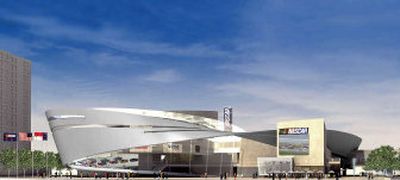NASCAR’s Hall of Fame is not for sale

CHARLOTTE, N.C. — In a sport famous for slapping sponsor names on every available inch of sheet metal and fire-retardant racing suit, it appears NASCAR has finally found something it doesn’t want to sell.
The historic moment comes deep on the 63rd page of a contract between NASCAR and the city of Charlotte to build a NASCAR Hall of Fame in the city’s downtown by the end of the decade.
“Neither party shall sell any naming rights or presenting sponsorship for the HOF (e.g. ‘The XYZ Company NASCAR Hall of Fame’ or ‘The NASCAR Hall of Fame presented by ABC Company’) without the other party’s prior approval.”
Yes, it’s true. The folks who this year will bring you the “Banquet 500 presented by ConAgra Foods” and the “Bass Pro Shops MBNA 500” don’t want a bunch of corporate names getting in the way of the clearly stated “NASCAR Hall of Fame.”
“We think that would probably go beyond the bounds of good taste,” said Mark Dyer, NASCAR’s vice president of licensing.
It’s a twist on the naming rights game of publicly funded sports stadiums. Instead of selling out to a corporation willing to pay big bucks to adorn a building with its name, Charlotte — which will build and pay for the hall — will pay NASCAR for the right to put its wildly popular name above the door. The city is counting on that name to draw NASCAR’s famously loyal fans, who will be asked to pay $17 a ticket.
“We didn’t want to have a particular corporate name on it, because we wanted the purity of the NASCAR name,” said Tim Newman, who heads the Charlotte Regional Visitors Authority, which will own and operate the Hall of Fame.
The deal, reached after a week of final negotiations that had officials in Atlanta futilely sweetening their offer by tens of millions of dollars in a last-ditch effort to win the hall, contains dozens such clauses, each spelling out exactly how the NASCAR name and brand may be used to promote and market the $107.5 million Hall of Fame.
“It is a licensing deal,” Dyer said. “Although I wouldn’t call this a standard licensing deal.”
Indeed, some have likened the pending partnership to a marriage, and the agreement between the city and the stock-car association often reads like a prenuptial agreement:
“ The only outdoor advertising allowed at the hall when it opens in 2009 will be that of exclusive NASCAR partners.
“ The Hall of Fame logo will belong to NASCAR, but must include the word “Charlotte.” In the event things go sour and the parties end up divorcing, NASCAR gets custody of the logo — but Charlotte is allowed to retain the rights to its own name.
“ NASCAR will provide archival material and has final approval over all exhibits at the hall, which will be run by the Charlotte Regional Visitors Authority, the public agency that also operates the city’s convention center, a 1950s-vintage arena and a civic auditorium.
By its standards, NASCAR isn’t getting much for the use of its name. Officials estimate royalties and other payments will add up to $1.8 million in the hall’s first year, and NASCAR has agreed not to take a payment in any year when the fee would cause the hall to lose money. Outside the licensing fees paid to NASCAR, any operating profits are to be reinvested in the museum.
But a late addition to the deal gave NASCAR the right to develop a 300,000-square-foot office tower as part of the Hall of Fame. With NASCAR paying just $1 annually to lease the land under the tower, and with the downtown Charlotte real estate market currently booming, that could be hugely lucrative. Space in the nearby One Wachovia Center building leases now for $26 per square foot — at that rate, space in the projected NASCAR tower would be worth nearly $8 million annually.
NASCAR plans to have a significant presence in Charlotte, but leaders have said they do not plan to move the company’s headquarters from Daytona Beach, Fla.